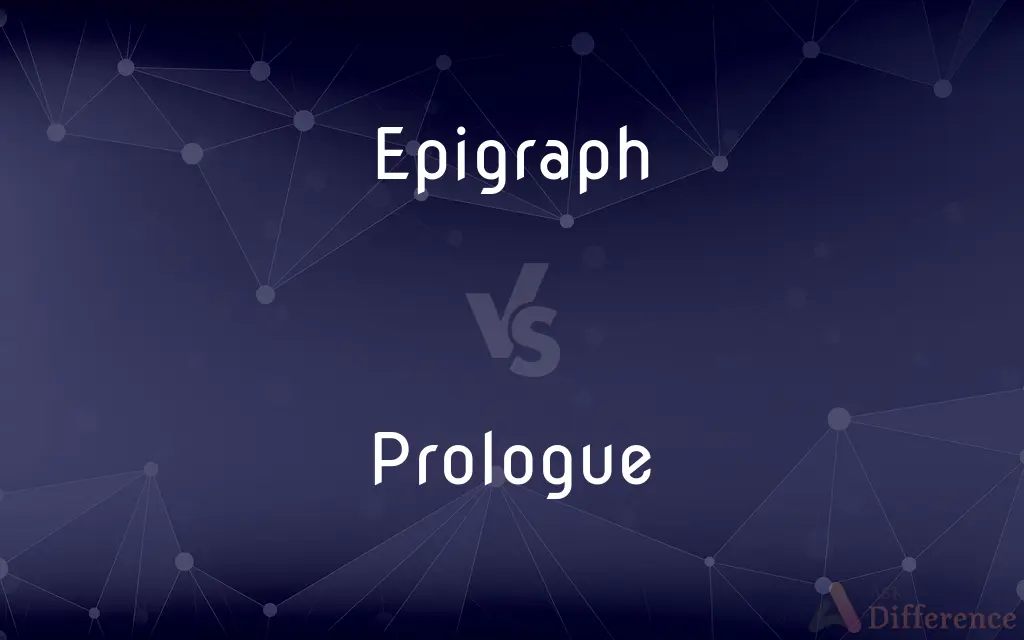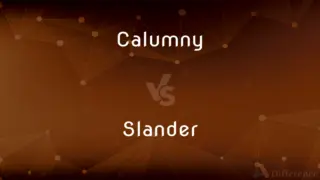Epigraph vs. Prologue — What's the Difference?
By Tayyaba Rehman & Urooj Arif — Updated on April 28, 2024
Epigraphs are short quotations or poems at a book's beginning, hinting at themes; prologues are introductory sections that set the story's background.

Difference Between Epigraph and Prologue
Table of Contents
ADVERTISEMENT
Key Differences
An epigraph is typically a brief quotation or poem placed at the beginning of a book or chapter, used to set a thematic tone or suggest the content's overarching themes. On the other hand, a prologue serves as a separate introductory section of a narrative, providing background information or details that are crucial to understanding the forthcoming story.
Epigraphs are often sourced from other literary works, famous sayings, or historical texts, aiming to connect the reader's mind to the themes or philosophical underpinnings of the book. Whereas prologues are written by the author of the book itself and are part of the narrative, offering insights or events that directly tie into the main plot.
The use of an epigraph is optional and does not affect the narrative structure; it acts more like a literary tool for setting a tone or creating a context. Conversely, prologues play a more functional role in the story, often crucial for setting the stage or explaining the setting before the main action begins.
Epigraphs can be enigmatic, challenging readers to make connections between the quote and the text that follows. On the other hand, prologues are generally more straightforward, aimed at easing the reader into the world of the book and its characters.
While epigraphs are usually very short and centered on thought-provocation or thematic hints, prologues can vary significantly in length and detail, depending on how much groundwork the author needs to lay for the reader.
ADVERTISEMENT
Comparison Chart
Definition
A short quote or poem at a book's beginning.
An introductory section setting up the story.
Purpose
To hint at the theme or tone of the book.
To provide background information or context.
Origin
Often from another source.
Written by the book’s author.
Length
Usually one or two lines.
Can be a few paragraphs to several pages.
Narrative Connection
Indirect, thematic.
Direct, often part of the story’s chronology.
Compare with Definitions
Epigraph
An excerpt that suggests the essence of a book.
Her choice of an epigraph clearly reflects the philosophical questions tackled in her book.
Prologue
A part of the book that sets up story arcs.
The prologue introduces the protagonist in a predicament that foreshadows future challenges.
Epigraph
A snippet from another work to provoke thought.
Using a Shakespearean epigraph, the author connects her story to classic themes of betrayal and fate.
Prologue
An introductory section in a book.
The prologue set in the past helped clarify the origins of the conflict described in the novel.
Epigraph
A thematic prelude to a narrative.
The epigraph serves as a thematic doorway into the complexities of the plot.
Prologue
Background information provided before the main story.
In the prologue, the author lays the groundwork for the fictional universe of his series.
Epigraph
A short quotation or saying at the start of a book.
The epigraph All happy families are alike; each unhappy family is unhappy in its own way from Tolstoy sets the tone for the novel.
Prologue
An essential segment of the book's structure.
The prologue provides critical insights that are referenced throughout the series.
Epigraph
A literary tool used to hint at themes.
An epigraph can be a cryptic clue to the novel's deeper themes.
Prologue
A narrative hook to engage readers.
The prologue’s dramatic scene captures the reader’s attention immediately.
Epigraph
An inscription, as on a statue or building.
Prologue
A prologue or prolog (from Greek πρόλογος prólogos, from πρό pró, "before" and λόγος lógos, "word") is an opening to a story that establishes the context and gives background details, often some earlier story that ties into the main one, and other miscellaneous information. The Ancient Greek prólogos included the modern meaning of prologue, but was of wider significance, more like the meaning of preface.
Epigraph
A motto or quotation, as at the beginning of a literary composition, setting forth a theme.
Prologue
An introduction or preface, especially a poem recited to introduce a play.
Epigraph
An inscription, especially on a building.
Prologue
An introduction or introductory chapter, as to a novel.
Epigraph
A literary quotation placed at the beginning of a book or other text.
Prologue
An introductory act, event, or period.
Epigraph
The set of all points lying on or above the function's graph.
Prologue
A speech or section used as an introduction, especially to a play or novel.
Epigraph
(transitive) To provide (a literary work) with an epigraph.
Prologue
One who delivers a prologue.
Epigraph
Any inscription set upon a building; especially, one which has to do with the building itself, its founding or dedication.
Prologue
(computing) A component of a computer program that prepares the computer to execute a routine.
Epigraph
A citation from some author, or a sentence framed for the purpose, placed at the beginning of a work or of its separate divisions; a motto.
Prologue
(cycling) An individual time trial before a stage race, used to determine which rider wears the leader's jersey on the first stage.
Epigraph
A quotation at the beginning of some piece of writing
Prologue
To introduce with a formal preface, or prologue.
Epigraph
An engraved inscription
Prologue
The preface or introduction to a discourse, poem, or performance; as, the prologue of Chaucer's "Canterbury Tales;" esp., a discourse or poem spoken before a dramatic performance
Prologue
One who delivers a prologue.
Prologue
To introduce with a formal preface, or prologue.
Prologue
An introduction to a play
Common Curiosities
What is an epigraph?
An epigraph is a short quotation or poem placed at the beginning of a book or chapter to suggest its themes.
What is a prologue?
A prologue is an introductory section of a book that sets up the story's background or provides details important to the narrative.
Can a prologue be skipped when reading a book?
Skipping a prologue might cause the reader to miss important context or information crucial for understanding the story.
Can a book have both an epigraph and a prologue?
Yes, a book can feature both an epigraph to hint at thematic elements and a prologue to establish the story's background.
What is the main purpose of a prologue?
The main purpose of a prologue is to provide background information that enhances the reader’s understanding of the story.
Are epigraphs always quotes from other works?
Often, but not always; epigraphs can be quotes, poems, or original lines that relate to the book's themes.
How long is a typical prologue?
Prologues vary in length but typically range from a few paragraphs to several pages.
How do epigraphs affect the reading experience?
Epigraphs set a thematic tone and can enrich the reader's understanding of the book’s themes and motifs.
What makes a good epigraph?
A good epigraph subtly hints at the narrative’s themes and intrigues the reader without being overtly explanatory.
How do authors choose epigraphs?
Authors select epigraphs that resonate with or reflect on the themes and emotional tone of their book.
Is the prologue considered part of the main story?
Yes, although it's set apart from the main narrative, it is officially part of the story and often crucial to it.
Can an epigraph spoil the plot of the book?
Properly chosen, an epigraph should not spoil the plot but enhance the reader's anticipation and engagement.
Do all novels need an epigraph?
No, using an epigraph is a stylistic choice and not a necessity for novels.
What role does a prologue play in a series?
In a series, a prologue can provide a backstory or details that link various parts of the series together.
Why might an author choose to exclude a prologue?
An author might exclude a prologue if they prefer to incorporate all background information directly into the narrative, or to maintain a faster narrative pace from the start.
Share Your Discovery

Previous Comparison
Apex vs. Peak
Next Comparison
Calumny vs. SlanderAuthor Spotlight
Written by
Tayyaba RehmanTayyaba Rehman is a distinguished writer, currently serving as a primary contributor to askdifference.com. As a researcher in semantics and etymology, Tayyaba's passion for the complexity of languages and their distinctions has found a perfect home on the platform. Tayyaba delves into the intricacies of language, distinguishing between commonly confused words and phrases, thereby providing clarity for readers worldwide.
Co-written by
Urooj ArifUrooj is a skilled content writer at Ask Difference, known for her exceptional ability to simplify complex topics into engaging and informative content. With a passion for research and a flair for clear, concise writing, she consistently delivers articles that resonate with our diverse audience.













































